|

|
|
Embarrassing Followers
by Charles Carreon
October 14, 2013
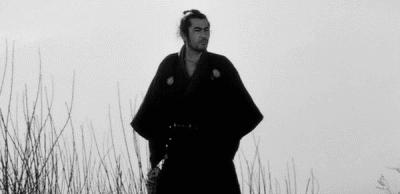
I was nineteen years old, barefoot in front of about a dozen
tai chi students on the lawn in front of the most southern
and traditional of the buildings on the ASU campus. I had
learned tai chi from a woman at ASU, and after a couple of
years of practice, and reading Al Huang’s beautiful book,
“Embrace Tiger, Return to Mountain,” I decided to teach
others. I joined movement instruction with guided
visualization, and the students loved it. Attendance stayed
high throughout the semester, and we even met for extra
sessions on the campus lawns, as we were doing on this day.
One of my students was a handsome young lawyer named Kit, a
refined gentleman in his thirties who had dark hair and a
close-cropped dark beard. He gave off a slight whiff of
superiority, while working gamely to relax the surface
rigidity that infused his body. He always maintained a
slightly aloof stance, and seemed quietly amused at my
audacity in holding myself out as a tai chi teacher. At
some point, he started to react negatively to something I
had barely noticed, which was that by silent consensus, the
group had adopted the view that whatever I said to do had to
be done. This was necessary, in effect, because I often did
interactive guided visualizations where, for example, half
the people play yin roles, and half play yang roles, so
people adapt to each other and perhaps fuse their energy
fields.
So there we were on the lawn, doing one of these interactive
visualization movements, where half of the students are
passing imaginary energy-spheres to the other half of the
students. Well, Kit declined to play his role. He adopted
a stiff pose, and like Bartleby the Scrivener declaring that
he “preferred not to,” stopped performing my instructions.
It was an alarming development, Kit going on strike. His
fellow spiritual laborers were shocked. Their eyes begged
him to come to his senses, their bodies inclined toward him,
their arms reached out, fingers extended, voices beseeching,
trying to draw him back into the sacred labor. At the head
of the group, I spoke to Kit like a man trying to lure a
kitten out of a tree. Kit began backing away, I followed,
and he broke into a semi-run. I and the entire group surged
after him briefly, until a thought brought me up short —
“This is not right. The tai chi class should not chase Kit
around the campus. In fact, I think we are acting crazy.”
Gesturing behind my back, I stopped the forward surge of my
students, and told Kit to please feel free to go. After the
obligatory exchanges of nonsense words that inevitably
conclude such donnybrooks, he left.
I left off with giving public classes after other events
occurred that confirmed I was having incipient cult
problems. In those years, cults sprang up like dust devils
in the heat, and the idea of having followers was beyond
serious conception. While I read holy books in abundance, I
was sifting these works for bliss-provoking illuminations,
and understood ethics in a manner befitting a member of the
organic-food/hippie subculture – in pretty broad strokes. I
realized that while I could help people experience
“meditative states,” I didn’t have much to offer those
seeking spiritual insight beyond homilies lifted from holy
books. So I could bullshit students or bow out of the
teaching game. I chose to give it up.
Later in life, when I have received occasional spurts of
admiration in my legal career, I have tried to ask myself,
“Who is this person, and why do they like me?” Sometimes
the answer has been, “I just got this guy a great deal and
he’s going to get out of jail sooner than he’d hoped, so
he’s momentarily filled with gratitude.” At such moments,
often experienced in a jail consultation cell, I figured it
was okay to bask in the glow. But you know, if you’re
sitting in your office and you ask yourself who loves you,
and your answer is “a bunch of felons,” then you might begin
to feel like life was passing you by, and you should do
something to acquire at least some friends with a more
socially acceptable profile. That happened to me after five
years of being a Federal public defender. I really felt
like I needed to get out more, meet ordinary people, and
think about something other than crime.
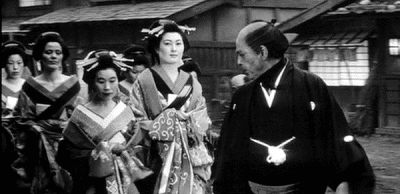
So I stopped taking criminal cases, and therefore spent less
time thinking about crime. One has to think about
something, however, and I ended up thinking about sex. That
may have lead to me working on the Sex.Com case, which lead
to representing pornographers, who can be somewhat
embarrassing to represent. But times being what they are,
most lawyers will agree to perform lawful services within
their professional specialty when legal tender is offered in
a sufficient amount, regardless of the source.
It has been said that I must have been hard up to take on
FunnyJunk as a client, but that is a shot in the dark that
misses its mark. Times were good when FunnyJunk came along,
and I snagged the work happily, as someone who is always
glad to get something new in the pipelines. To live is a
dynamic flow, like flying a ram jet engine – the forward
motion of the jet is essential to the functioning of the
engines – or like a shark, that lacks gills and thus must
cruise the depths continuously or die.
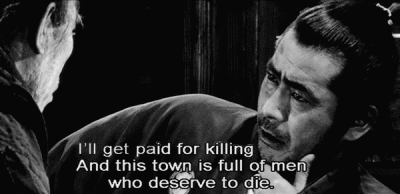
My work requires knowledge and skill, and I’ve gained some
modest renown among those who know the quality of my work
and the reliability of my advice. Those people seem to know
other people, and thus, work arrives in time to meet some
need and supply modest pleasures. I have a very short list
of friends who say they like what I do in a creative way, so
I inflict my works on them. I even get a heaping of
adulation from my wife, balanced by savage recriminations of
the most affectionate sort. So I’ve got all the friends I
need.
You are incredulous, I see. How could I possibly have all
the friends I need when I’m not even on Facebook? There you
have it — a koan for the Social Media Buddhists.
I’m like the opposite of Popehat Ken White in this regard.
He has many, many followers, and lots of them are chasing
me. I know it’s not going to occur to Popehat, as it did to
me, “This is wrong. Popehat followers should not chase
Charles Carreon all over the Internet.” Not that I’m
claiming to be superior. I was a much younger man then,
nineteen, a far more intelligent time of life when it comes
to realizing the obvious. And unlike Popehat, my youthful
self had not spent a lifetime developing a legal philosophy
to provide a cover story for personal indulgences.
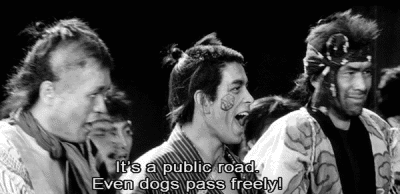
Safe inside his cover story, Popehat is machinating like L.
Ron Hubbard targeting suppressives. His head thrust against
his periscope, he ceaselessly scans the sea for the latest
foolish captain to pilot the S.S. Douchebag into his
sights. “Fire 1! Fire 2!” A pause to gauge the effects,
then, “We hit her amidships!” Popehat’s crew roars with
triumph, and Popehat himself, oblivious to all but the
delicious sensation of having his hindquarters laved by
eager tongues, hoarsely exhorts his
“army
of Davids” to further reputational mayhem.
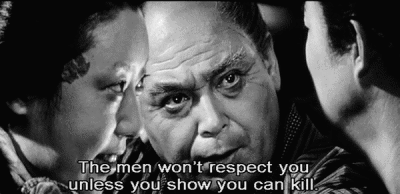
Popehat is an apologist for hate speech, and the proof is,
he denies it proactively, while he invokes the First
Amendment to protect hate speakers. Proactive denials are
virtually always an admission of conscious wrongdoing.
Who pushes hate speech, now and in the past?
Reactionaries. Right wingers. Their arguments are often
nine-tenths verbal violence. They spew death threats, use
rape metaphors, ascribe all manner of physical deformity and
pathological mental states to their objects of hatred. When
people victimized by these outrages try to speak up, the
Free Speech Mafia, responding to the “Popehat signal” will
rise to the defense of these loose-lipped spittle warriors
by asserting that their hate speech was protected by the
First Amendment. The Internet has turned into the type of
small town where a group of bullies is terrorizing everyone,
pushing everyone’s buttons and daring them to talk back.
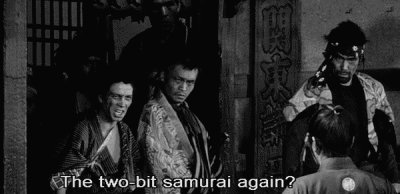
There’s been other times in my life when I’ve looked around
at the quality of my associates, and realized it was time
for a change. Popehat may have high-sounding explanations
to justify his conduct, but in time, the luster of being
Judge Lynch for the lynching crowd is going to be seen in a
much clearer light. Like the Salem judges, that history has
judged fairly, consigning them to the annals of judicial
infamy, Popehat has established a legacy that would already
cause the head of a feeling man to bow in shame.
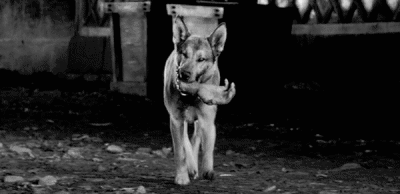
_______________
Note:
All images screencaptured from “Yojimbo,” directed by Akira
Kurosawa, copyright 1961 Toho Co., Ltd. English
subtitled version copyright 2006 Toho International Co.,
Ltd.
|